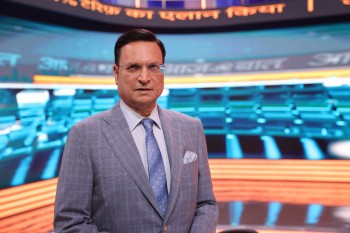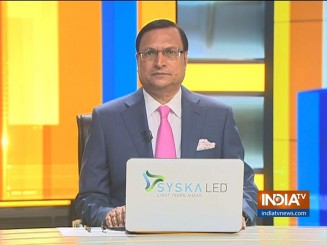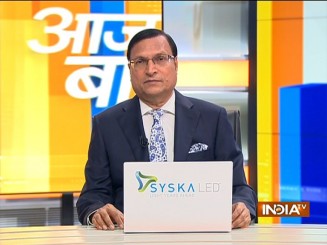Cloudbursts : Hear the warning of Mother Nature
 The death toll in the flash flood following a sudden cloudburst in Kishtawar, Jammu & Kashmir has reached 60, with fears of more casualties. 167 persons have been rescued and over 100 people are injured. Over 250 people are reported missing even after 24 hours have passed. Rescue work has hit a hurdle due to incessant rains.
The death toll in the flash flood following a sudden cloudburst in Kishtawar, Jammu & Kashmir has reached 60, with fears of more casualties. 167 persons have been rescued and over 100 people are injured. Over 250 people are reported missing even after 24 hours have passed. Rescue work has hit a hurdle due to incessant rains.
There were nearly 1,000 pilgrims present for the Machail Mata annual yatra, when nature struck. Chasoti village, located 90 km from Kishtwar, was the base camp from where the pilgrims took the hilly route to reach the temple. Houses, shops, vehicles were destroyed as torrents of flood water alongwith mudslides and debris struck the village destroying everything that fell on the route.
NDRF, SDRF, state police and army personnel are trying to trace the missing persons and ferry the injured pilgrims to care centres. Prime Minister Narendra Modi spoke to J&K chief minister Omar Abdullah and Lt. Gov Manoj Sinha and assured all possible help.
In Lahaul Spiti, Himachal Pradesh, huge boulders and muddy rocks fell with gushing flood water after a sudden cloudburst. In Rampur near Shimla, flash flood after cloudburst caused widespread damage in Nanti gaon, Ganvi gaon and Kasha Path.
The number of cloudburst incidents in J&K, Himachal and Uttarakhand has doubled in the last two months compared to the figures of last five years. This has caused serious concern. The government has set up a panel of five scientists to find out the reasons behind frequent cloudbursts.
Frequent cloudbursts followed by flash flood are a clear sign of warning from Mother Nature. The main reasons : Unregulated constructions blocking the path of rivers and deforestation. Already, we have lost a large number of people due to cloudbursts in Uttarakhand, HP and Jammu and Kashmir. If we fail to take prompt action despite watching the frightening visuals of the fury of flash flood water, then similar tragedies may again take place. If we do not learn a lesson from such tragedies, the fury of nature will increase.
Remove all weak trees from Delhi pavements
A 50-year-old man Sudhir Kumar died and his 22-year-old daughter Priya was critically injured when a neem tree on the roadside suddenly fell on their motorbike near Paras Chowk in Delhi’s Kalkaji locality on Thursday. Sudhir was ferrying his daughter to her office in Amar Colony when this tragedy occurred.
The uprooted tree had to be cut and the two were extricated and shifted to Safdarjang hospital, where Sudhir Kumar was declared dead. Priya suffered a fracture in her pelvic region. Nearly 250 pedestrians tried to remove the uprooted tree but failed. All this happened when Delhi witnessed a continuous downpour since morning.
Delhi CM Rekha Gupta has asked officers to carry out a survey of all old trees that have become weak and fall anytime. The neem tree that fell on Sudhir Kumar and his daughter was on the verge of being uprooted.
There are hundreds of trees on the roadside across Delhi which have become weak and can fall anytime. Most of the roots of these trees have become hollow because concrete constructions have been made around them for providing space for pavements. In several places, old trees have become weak due to cabling.
Under Section 8 of Delhi Preservation of Trees Act, 1994, no tree can be removed from any land without prior permission from the ‘Tree Officer’, even on privately owned property. The Tree Officer may grant permission after inspecting the tree and he is supposed to respond within 60 days. Municipal authorities avoid cutting trees because of this law, but there is a provision in that law for emergency cases. The Delhi Chief Minister has used this emergency provision to instruct officers to carry out survey of all weak trees and remove them to avoid such tragedies.
The CM has done the right thing, but the question is: Shouldn’t authorities have taken this step long back? Why didn’t authorities use this emergency provision? What action will be taken against those officers who are responsible for this death, due to sheer negligence?
Haryana and J&K: Modi Pass, Rahul Fail
 The voters of Haryana and Jammu & Kashmir have given historic verdicts. They have given clear mandates, but the results have surprised everybody. Neither the BJP, nor the Congress, nor psephologists had any inkling of the results that were going to come in from Haryana. One point is now clear. Narendra Modi is BJP’s biggest strength. He fights elections with fervour and toils hard. The historic hat-trick in Haryana will fire up Modi to prepare his strategies for Jharkhand and Maharashtra elections. It will instill new confidence and energy among BJP workers in both the states. BJP’s bargaining power in Maharashtra’s Mahayuti alliance will increase.
The voters of Haryana and Jammu & Kashmir have given historic verdicts. They have given clear mandates, but the results have surprised everybody. Neither the BJP, nor the Congress, nor psephologists had any inkling of the results that were going to come in from Haryana. One point is now clear. Narendra Modi is BJP’s biggest strength. He fights elections with fervour and toils hard. The historic hat-trick in Haryana will fire up Modi to prepare his strategies for Jharkhand and Maharashtra elections. It will instill new confidence and energy among BJP workers in both the states. BJP’s bargaining power in Maharashtra’s Mahayuti alliance will increase.
The biggest message from Haryana verdict is that the narrative created by Congress and other opposition parties about caste reservation, by creating a sense of fear in the minds of Dalits, has now been nullified. In the coming weeks, one may find Modi trying to fix other problems, one by one. He has already reconfigured the pension scheme and brought unanimity. Problems relating to farmers, employment, youths will be resolved. This, in short, is Modi’s roadmap for the next few months.
And now, an analysis about Haryana and J&K assembly elections.
HARYANA
For the first time in 57 years, a party has got a third consecutive chance to form a government in Haryana. Even BJP leaders were surprised when the party won 48 out of a total of 90 seats, a clear majority. Congress bigwigs had to cancel their celebrations as trends came in. By evening, the party started alleging that EVMs (electronic voting machines) were tampered with. But Kumari Selja, the Dalit Congress leader, said there was no point cribbing and the party high command should find out the real reasons for the defeat.
Narendra Modi’s victory in Haryana will work as a ‘sanjeevani'(life-giving medicine) for the BJP. Those who were speaking about Modi’s waning popularity have been given a clear reply by the electorate. Congress leadership is now demoralized after having created a big hype about the possibility of winning Haryana polls. Those who were projecting Rahul Gandhi as having the Midas touch, will now find that his ‘herbal medicines’ have failed.
The Congress used all its fire power in Haryana, and the debate in the party during electioneering was not about how many seats it was going to win, but who would become the Chief Minister. For Rahul Gandhi, who was dreaming of ‘conquering’ one state after another, the Haryana result has come as a huge setback. Rahul used to say at his rallies that Modi’s shoulders have drooped after the Lok Sabha polls, but now he must be seeing Modi’s 56-inch chest in his dreams. The defeat in Haryana will surely reduce Rahul’s strength in the INDIA bloc. Already, one alliance partner (Shiv Sena UBT) from Maharashtra has remarked that Congress always finds it difficult to win, wherenever there is a straight contest between Congress and BJP. For Congress leaders, it will take time to find out the exact reasons why the party lost. They are yet to recover from the impact.
Narendra Modi is right when he says that whenever Congress loses, it questions EVMs and blames the Election Commission. AAP supremo Arvind Kejriwal said, Congress lost in Haryana because of overconfidence. Congress leaders had taken victory in Haryana for granted and they had briefed Rahul Gandhi that the farmers, women, Jats and youths were against BJP. They were citing Agniveer, farmers’ agitation and Delhi women wrestlers’ agitation as examples. An atmosphere was created to project that Congress return to power was certain.
The result: Infighting began over who would become the CM. Randeep Singh Surjewala did not move out of Kaithal, Kumar Selja stayed at home for most part of the electioneering period, and the party had to bear the brunt. The voters of Haryana have given a clear message that they would support only those leaders who would work on the ground.
Secondly, the decimation of regional and small family-centric parties like INLD, JJP, shows that the days of dynastic politics are almost over. The voters have ruthlessly defeated the members of Chautala dynasty, and rejected Bahujan Samaj party and Kejriwal, too. It is true that in the early days of campaigning, the wind was blowing against the BJP because of the anti-incumbency factor after 10 years of rule. But Narendra Modi silently prepared his strategy.
The entire focus was shifted to project that this election was not about Haryana, but about picking the right choice between BJP and Congress. The message was sent that this was an election against dynastic politics and casteism, a fight between what Modi frequently says, ‘naamdaar'(those belonging to dynasty) vs ‘kaamdaar’ (those who work). Modi’s formula clicked and the voters of Haryana made history.
JAMMU & KASHMIR
The results of Jammu & Kashmir have also suprised many. National Conference won more seats that its leaders had expected, while Congress’ performace was poor. The NC-Congress alliance has got a clear majority of 48 in a House of 90. Out of this, Congress has won only six seats, while NC has won 42. Out of the 90 seats, 47 are in Kashmir Valley and 43 in Jammu region.
The interesting point is, BJP won 29 out of 43 seats in Jammu region, but could not open its account in Kashmir valley. The biggest setback was for Mehbooba Mufti’s JKPDP, which won only three seats. As the picture became clearer, NC leader Dr Farooq Abdullah describes the results as a people’s mandate for bringing back Article 370. He declared that his son Omar Abdullah will be the new CM. Omar has won from both seats, Ganderbal and Budgam.
BJP’s win in Jammu region is not a big achievement. The surprising part IS that in Kashmir Valley, though the common voters admitted that life has returned to normal after revocation of Article 370, with cinema halls reopening, stone throwers vanishing, yet they said clearly on camera that they would not vote for Modi. The gainer was National Conference. Though BJP did not get votes, at least it has the satisfaction that common people in the Valley have appreciated Modi’s work during the last five years.
Farooq Abdullah and his son will now be facing a Catch-22 situation. They have promised to bring back Article 30, but they know it quite well that it is the Parliament which has the power to take such a big decision. So, till the time the NC government stays in power, its leaders would still be searching for answers on this point.
Polling in Kashmir : Refugee dream realized after 75 years
 I have been observing elections in Jammu and Kashmir for the last 40 years. For the first time, on Tuesday, I watched voters beating drums outside polling booths and dancing to drumbeats. Such a scene was never witnessed in Jammu and Kashmir in the past, during polling. Those celebrating the festival of democracy are termed by officials as ‘West Pakistani Refugees’. They got their voting rights for the first time in 75 years, after the abrogation of Article 370 in 2019. West Pakistani Refugees, Valmiki Samaj and Gorkha community people were never given rights in the past to vote for Assembly or Parliamentary elections. They were entitled to vote only for Block Development Council and District Development Council elections. I remember, seven years ago in 2017, Dr Farooq Abdullah was contesting Lok Sabha elections from Srinagar. There were 12,61,315 names in the voters’ list, but only seven percent voters reached the polling booths. Dr Farooq Abdullah got only about 48,000 votes and won. Contrast this with the polling figures on Tuesday, when Jammu and Kashmir recorded 65.65 per cent voting in the third phase. This itself is indicative of a sea change that has come in Kashmir politics. During Partition, 75 years ago, those who had to leave their homes in West Pakistan and Pakistan Occupied Kashmir, and settle in Jammu and Kashmir, had to live as refugees in their own homeland, devoid of the right to cast their vote. For 75 years, there were being addressed as ‘Pakistani’. But these were people who had crossed over in 1947, when India was undivided before Partition. Nearly 22 thousand families had to live in their own homeland as ‘refugees’ for 75 years. More than three to four generations died without realizing their dream to be called a ‘Bharatiya’ or a ‘Kashmiri’ one day. On Tuesday, they looked ecstatic, having their fingers inked by polling officers before casting their precious vote. The tears of happiness on the faces of women cannot be described in words. These are people who realize the true meaning of abrogation of Article 370. We can only realize their level of happiness, but cannot gauge the magnitude of their pain. They had to bear the cross of ‘Article 370’ for 75 years. On Tuesday, there was hundred per cent polling among these families. They were openly saying they would vote for Modi, because the Prime Minister gave them their voting right. They are unhappy with National Conference which has promised to bring back Article 370 in its manifesto. Congress is in electoral alliance with National Conference in this election. Prime Minister Narendra Modi, on Tuesday, rubbed wounds into the opposition, by telling an election rally in Haryana that Congress leaders have never spoken about reoccupying Pak Occupied Kashmir, even till this date.
I have been observing elections in Jammu and Kashmir for the last 40 years. For the first time, on Tuesday, I watched voters beating drums outside polling booths and dancing to drumbeats. Such a scene was never witnessed in Jammu and Kashmir in the past, during polling. Those celebrating the festival of democracy are termed by officials as ‘West Pakistani Refugees’. They got their voting rights for the first time in 75 years, after the abrogation of Article 370 in 2019. West Pakistani Refugees, Valmiki Samaj and Gorkha community people were never given rights in the past to vote for Assembly or Parliamentary elections. They were entitled to vote only for Block Development Council and District Development Council elections. I remember, seven years ago in 2017, Dr Farooq Abdullah was contesting Lok Sabha elections from Srinagar. There were 12,61,315 names in the voters’ list, but only seven percent voters reached the polling booths. Dr Farooq Abdullah got only about 48,000 votes and won. Contrast this with the polling figures on Tuesday, when Jammu and Kashmir recorded 65.65 per cent voting in the third phase. This itself is indicative of a sea change that has come in Kashmir politics. During Partition, 75 years ago, those who had to leave their homes in West Pakistan and Pakistan Occupied Kashmir, and settle in Jammu and Kashmir, had to live as refugees in their own homeland, devoid of the right to cast their vote. For 75 years, there were being addressed as ‘Pakistani’. But these were people who had crossed over in 1947, when India was undivided before Partition. Nearly 22 thousand families had to live in their own homeland as ‘refugees’ for 75 years. More than three to four generations died without realizing their dream to be called a ‘Bharatiya’ or a ‘Kashmiri’ one day. On Tuesday, they looked ecstatic, having their fingers inked by polling officers before casting their precious vote. The tears of happiness on the faces of women cannot be described in words. These are people who realize the true meaning of abrogation of Article 370. We can only realize their level of happiness, but cannot gauge the magnitude of their pain. They had to bear the cross of ‘Article 370’ for 75 years. On Tuesday, there was hundred per cent polling among these families. They were openly saying they would vote for Modi, because the Prime Minister gave them their voting right. They are unhappy with National Conference which has promised to bring back Article 370 in its manifesto. Congress is in electoral alliance with National Conference in this election. Prime Minister Narendra Modi, on Tuesday, rubbed wounds into the opposition, by telling an election rally in Haryana that Congress leaders have never spoken about reoccupying Pak Occupied Kashmir, even till this date.